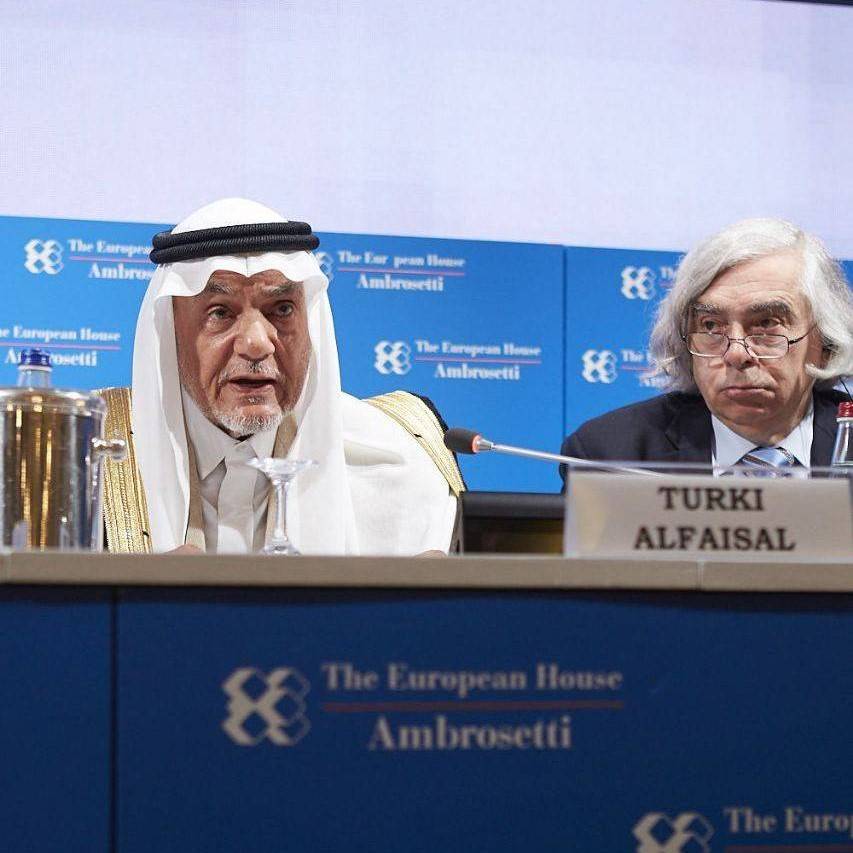Turki Alfaisal: UN is still trying to tackle the world's problems as if it were 1945
The United Nations has become unfit for purpose as it insists on attempting to fix the world's problems as if it were 1945, Prince Turki Alfaisal, Chairman of the Board, King Faisal Center for Research and Islamic Studies, speaking at At 43rd edition of “Intelligence on the World, Europe, and Italy" Ambrosetti Villa d’Este Forum, Friday, 01 September 2017, Cernobbio, Italy.
The full speech of Prince Turki titled "A Reflection on the State of Our World":
In the Name of God, the Merciful, the Compassionate. May God’s Peace and Blessing be upon you
Thank you, Mr. Valerio De Molli, for inviting me to speak today.
Great transformations throughout history carry with them risks and opportunities for individuals, states, societies, and the international community at large. Anarchy and a vacuum are the most dangerous threats facing our world. Great wars were the natural consequence of such situations and failures to address challenges that were facing humanity. Our world is fracturing before our eyes. However, only through international wisdom, cooperation and leadership, will the world deal with the immense challenges facing us at this juncture to avoid the inevitable disasters. I hope this will be the case.
Ladies and Gentlemen,
Wherever we look today on the map of the globe we find that there is a crisis in every corner and without a clear horizon for real solutions.
In the Far East, the world is on the brink of a major crisis that could become a global one if not peacefully resolved. The North Korean nuclear crisis and the threat of confrontation with the United States is not a danger looming exclusively over the Far East but the entire world. Peace and security that allowed Japan, South Korea, Taiwan, even China and the rest of Asia to thrive economically during the last six decades are threatened, and as a result, the world economy will suffer most.
Not far from this crisis is the border crisis in the Himalayas, which recently put nuclear India and Nuclear China armies in a state of readiness for military confrontation on the question of disputed borders between the Kingdom of Bhutan and China. This reminds the world of the outstanding danger of border disputes between India and China that led to the Sino-Indian War in 1962. Fortunately, both countries have drawn back from confrontations, but until when?
Adding to these crises in the Far East is the question of China-US relations, which no one can imagine how it will be in the future, not because of the differences over issues such as North Korea’s nuclear program, China's maritime expansion, or the Taiwan question; but over managing such relations to avoid what the American political scientist Graham Allison calls “The Thucydides Trap”. Drawing on the conclusion of the Greek historian that and I quote: “It was the rise of Athens and the fear that this inspired in Sparta, that made war inevitable.” Therefore, the pattern of history since the Peloponnesian War (431–404 BC) of the inevitability of war when a rising power challenges a dominant one, Allison found that twelve past cases out of sixteen since then ended in war. In his latest book titled: Destined for War: Can America and China Escape Thucydides’s Trap? Allison is not ruling out this inevitability if the United States and China continue managing their relation the way they were doing in the last few decades. This would be the most devastating to the entire world.
Ladies and Gentlemen,
The situation in the south and west Asia is not much better. The relations between rising nuclear India with its ultra-nationalist drive and nuclear Pakistan is an explosive issue. The two countries have not, after four wars between them, solved the issue of Kashmir peacefully or to deal effectively with ramifications of their wars. And each of them remains suspicious of the other. This situation carries with it the danger of exploding at any time if not tackled seriously by both parties and the concerned powers.
Peace in Afghanistan is still far-fetched. Conflicts and wars that are unremitting since the Soviet invasion in 1979 are persistent with no solution in sight. President Trump in his latest speech on Afghanistan promised to continue the war in this conflict-cursed country but without providing a vision for pacifying it. Threatening Pakistan and inviting India to do more, are not a prescription for peace in Afghanistan. Leadership in this respect requires more than a surge in the military and alienation of Pakistan.
In West Asia or the Middle East, the situation is beyond grasping. Continued internal wars in Iraq, Syria, Yemen are treating their existence as nation-states; rising non-state actors in some states, like Hizballah in Lebanon; growing terrorist threats, the polarization of societies, aggressive regional behavior by regional states, like Iran. Foreign interventions as manifested by Russian and Iranian intervention in Syria; the diplomatic crisis in the Gulf between Qatar and its sisters: Saudi Arabia, Bahrain, the United Arab Emirates and Egypt, that threatens the unity and survival of the Gulf Cooperation Council (GCC) as a unifying regional organization. Adding to these issues the protracted Israeli-Palestinian conflict that complicates the picture. The continuation of this conflict will always be a source of destabilization in the region and a source of breeding for radicalism and terrorism.
In North Africa, the situation is not different from the situation in the rest of the Middle East. Anarchism is the order of the day in Libya. Terrorism is destabilizing Egypt, Libya, and the rest of the Maghreb region. The spillover of this instability is affecting the rest of Africa with terrorism, and Europe with a deluge of refugees.
Ladies and Gentlemen,

